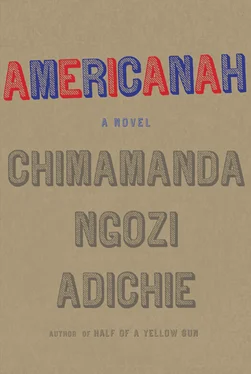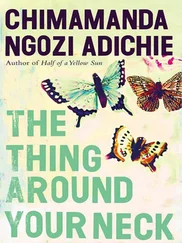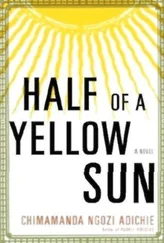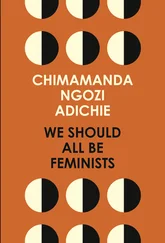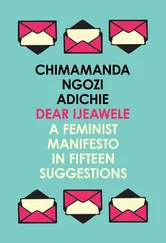“The wealthy like you, that is,” she quipped.
He paused. He often paused before he spoke. She thought this exquisite; it was as though he had such regard for his listener that he wanted his words strung together in the best possible way. “I like to think I don’t have that desperation. I sometimes feel as if the money I have isn’t really mine, as if I’m holding it for someone else for a while. After I bought my property in Dubai — it was my first property outside Nigeria — I felt almost frightened, and when I told Okwudiba how I felt, he said I was crazy and I should stop behaving as if life is one of the novels I read. He was so impressed by what I owned, and I just felt as if my life had become this layer of pretension after pretension and I started to get sentimental about the past. I would think about when I was staying with Okwudiba in his first small flat in Surulere and how we would heat the iron on the stove when NEPA took light. And how his neighbor downstairs used to shout ‘Praise the Lord!’ whenever the light came back and how even for me there was something so beautiful about the light coming back, when it’s out of your control because you don’t have a generator. But it’s a silly sort of romance, because of course I don’t want to go back to that life.”
She looked away, worried that the crush of emotions she had felt while he was speaking would now converge on her face. “Of course you don’t. You like your life,” she said.
“I live my life.”
“Oh, how mysterious we are.”
“What about you, famous race blogger, Princeton fellow, how have you changed?” he asked, smiling, leaning towards her with his elbows on the table.
“When I was babysitting in undergrad, one day I heard myself telling the kid I was babysitting, ‘You’re such a trouper!’ Is there another word more American than ‘trouper’?”
Obinze was laughing.
“That’s when I thought, yes, I may have changed a little,” she said.
“You don’t have an American accent.”
“I made an effort not to.”
“I was surprised when I read the archives of your blog. It didn’t sound like you.”
“I really don’t think I’ve changed that much, though.”
“Oh, you’ve changed,” he said with a certitude that she instinctively disliked.
“How?”
“I don’t know. You’re more self-aware. Maybe more guarded.”
“You sound like a disappointed uncle.”
“No.” Another one of his pauses, but this time he seemed to be holding back. “But your blog also made me proud. I thought: She’s gone, she’s learned, and she’s conquered.”
Again, she felt shy. “I don’t know about conquering.”
“Your aesthetics changed too,” he said.
“What do you mean?”
“Did you cure your own meats in America?”
“What?”
“I read a piece about this new movement among the American privileged classes. Where people want to drink milk straight from the cow and that sort of thing. I thought maybe you’re into that, now that you wear a flower in your hair.”
She burst out laughing.
“But really, tell me how you’ve changed.” His tone was teasing, yet she tensed slightly at his question; it seemed too close to her vulnerable, soft core. And so she said, in a breezy voice, “My taste, I guess. I can’t believe how much I find ugly now. I can’t stand most of the houses in this city. I’m now a person who has learned to admire exposed wooden rafters.” She rolled her eyes and he smiled at her self-mockery, a smile that seemed to her like a prize that she wanted to win over and over again.
“It’s really a kind of snobbery,” she added.
“It’s snobbery, not a kind,” he said. “I used to have that about books. Secretly feeling that your taste is superior.”
“The problem is I’m not always secret about it.”
He laughed. “Oh, we know that.”
“You said you used to? What happened?”
“What happened was that I grew up.”
“Ouch,” she said.
He said nothing; the slight sardonic raise of his eyebrows said that she, too, would have to grow up.
“What are you reading these days?” she asked. “I’m sure you’ve read every American novel ever published.”
“I’ve been reading a lot more nonfiction, history and biographies. About everything, not just America.”
“What, you fell out of love?”
“I realized I could buy America, and it lost its shine. When all I had was my passion for America, they didn’t give me a visa, but with my new bank account, getting a visa was very easy. I’ve visited a few times. I was looking into buying property in Miami.”
She felt a pang; he had visited America and she had not known.
“So what did you finally make of your dream country?”
“I remember when you first went to Manhattan and you wrote me and said ‘It’s wonderful but it’s not heaven.’ I thought of that when I took my first cab ride in Manhattan.”
She remembered writing that, too, not long before she stopped contacting him, before she pushed him behind many walls. “The best thing about America is that it gives you space. I like that. I like that you buy into the dream, it’s a lie but you buy into it and that’s all that matters.”
He looked down at his glass, uninterested in her philosophizing, and she wondered if what she had seen in his eyes was resentment, if he, too, was remembering how she had so completely shut him out. When he asked, “Are you still friends with your old friends?” she thought it a question about whom else she had shut out all these years. She wondered whether to bring it up herself, whether to wait for him to. She should bring it up, she owed him that, but a wordless fear had seized her, a fear of breaking delicate things.
“With Ranyinudo, yes. And Priye. The others are now people who used to be my friends. Kind of like you and Emenike. You know, when I read your e-mails, I wasn’t surprised that Emenike turned out like that. There was always something about him.”
He shook his head and finished his drink; he had earlier put the straw aside, sipping from the glass.
“Once I was with him in London and he was mocking this guy he worked with, a Nigerian guy, for not knowing how to pronounce F-e-a-t-h-e-r-s-t-o-n-e-h-a-u-g-h. He pronounced it phonetically like the guy had, which was obviously the wrong way, and he didn’t say it the right way. I didn’t know how to pronounce it either and he knew I didn’t know, and there were these horrible minutes when he pretended we were both laughing at the guy. When of course we weren’t. He was laughing at me too . I remember it as the moment when I realized he just had never been my friend.”
“He’s an asshole,” she said.
“Asshole. Very American word.”
“Is it?”
He half raised his eyebrows as though there was no need to state the obvious. “Emenike didn’t contact me at all after I was deported. Then, last year, after somebody must have told him I was now in the game, he started calling me.” Obinze said “in the game” in a voice thick with mockery. “He kept asking if there were any deals we could do together, that kind of nonsense. And one day I told him I really preferred his condescension, and he hasn’t called me since.”
“What of Kayode?”
“We’re in touch. He has a child with an American woman.”
Obinze looked at his watch and picked up his phones. “I hate to go but I have to.”
“Yes, me too.” She wanted to prolong this moment, sitting amid the scent of books, discovering Obinze again. Before they got into their separate cars, they hugged, both murmuring, “So good to see you,” and she imagined his driver and her driver watching them curiously.
“I’ll call you tomorrow,” he said, but she had hardly settled into the car when her phone beeped with a new text message from him. Are you free to have lunch tomorrow? She was free. It was a Saturday and she should ask why he would not be with his wife and child, and she should initiate a conversation about what they were doing exactly, but they had a history, a connection thick as twine, and it did not have to mean that they were doing anything, or that a conversation was necessary, and so she opened the door when he rang the bell and he came in and admired the flowers on her verandah, the white lilies that rose from the pots like swans.
Читать дальше
